Grayling fly fishing provides a fantastic opportunity to continue fishing when the trout and salmon fishing seasons close and avoids having to hang your waders until spring.
After a brief introduction, this article will cover all the key elements of how to catch grayling in autumn, i.e.
- Essential tackle requirements for grayling fly fishing
- Grayling fly fishing tactics for September, October, & November
Introduction
A grayling is a beautiful fish with a silvery body, a distinct ‘rainbow’ coloured dorsal fin, and a graceful demeanour until hooked!
Thus, it’s not surprising that the grayling is often called the…
“Lady of the Stream”
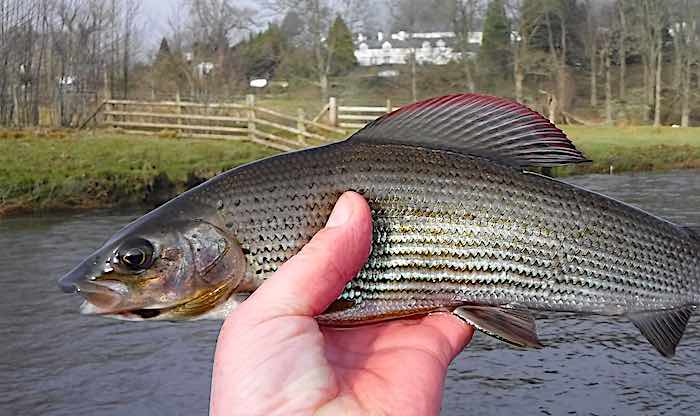
The grayling fishing season can vary slightly between rivers but is similar to that for coarse fish. On the Welsh Dee, a river I regularly fish, the grayling fishing season starts on the 16th of June and runs through to the 14th of March.
Grayling are members of the salmon family but unlike their relatives, grayling spawn in spring, and thus, come into prime conditions during autumn and winter. As such, they can often be relied upon to feed when the temperature drops to freezing.
Consequently, if you’re hardy enough, you can still fly fish for them when there’s snow on the ground or during a long spell of freezing weather.
So, let’s begin by briefly covering what fly fishing you’ll need to begin fly fishing for grayling…
Grayling fishing tackle requirements
If you fly fish for trout on rivers, you’re likely to have all the grayling fishing tackle needed. Outlined below are the essential fly fishing tackle requirements to cover dry, wet, and nymph fly fishing for grayling.
Grayling fly fishing rod & reel
A standard 9 to 10ft fly rod rated from 3 to 7wt with an appropriately matched reel will allow you to fly fish for grayling using dry flies, wet flies and nymphs.
My preference for dry and wet fly fishing for grayling is a soft-action, 9ft-6”, 5wt rod. Whereas, for Euro / Czech nymphing I use a lightweight 10 to 11ft 3# fly rod. Currently, I favour an 11ft 3# Vision Nymphmaniac fly rod matched with a Vision XLV nymph reel.
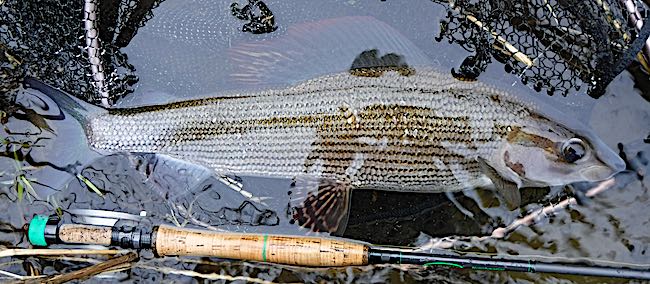
Fly Lines
The fly line should be matched to your rod. For wet and dry fly fishing I use a WF5 floating line (Airflo Lake Pro WF5). A standard dry fly line matched to your fly rod can be used for nymphing. However, I prefer to use a low-diameter (0.6mm) specialist nymphing fly (Airflo SNF Euro Nymph) because it helps with bite detection during windy conditions.
Leader & Tippet
For grayling dry fly fishing I use a 12ft copolymer or monofilament 3X tapered leader and add 3ft of 3 or 4 lb fluorocarbon tippet. On windy days switch the leader from a 12ft to a 9ft 3X tapered leader.
When fishing a team of three wet flies or spiders I use a 7ft copolymer or monofilament 5X tapered leader and add 6ft of 3 copolymer tippet for two droppers.
My standard leader setup for Euornymphing is made up of…
- 10m Daiwa tapered carp leader 30lbs to 12lbs
- RIO Two-Tone Indicator Tippet (2X)
- 3 – 5ft 4lb fluorocarbon tippet (Airflo Sightfree G3)
- Two 4” droppers spaced 18” apart (4 lb Fluorocarbon)
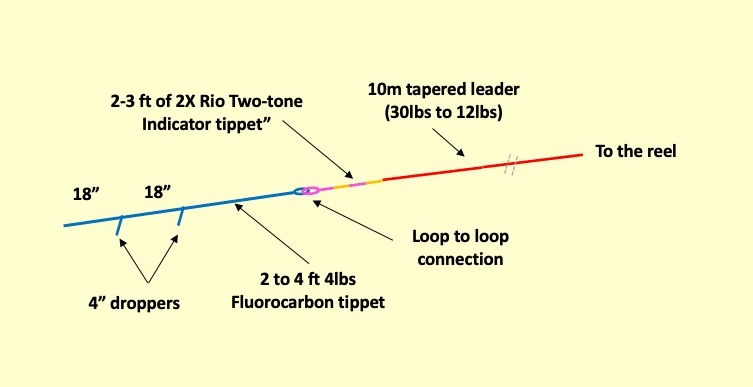
Indicator choice is personal because you need to select one that you can easily see. Currently, I use the 2X RIO Two-Tone Indicator, but I started using an indicator made from two different coloured 12lb lines joined together.
The following video covers making a three-fly Euro Nymphing rig for grayling fishing in high water.
Fly fishing accessories:
- A landing net with a magnet release clipped on the back of your jacket
- A bottle of dry fly floatant – I use Gink
- Line degreaser – I use Fulling Mill Fuller’s Mud
- Something to dry the fly – I use a dry microfiber cloth
- Insulated waders
- Neoprene gloves and warm clothing for when it gets cold.
Now the essential grayling fishing tackle requirements are covered, let’s get into the ‘MEAT’ of fly fishing for grayling during the autumn months…
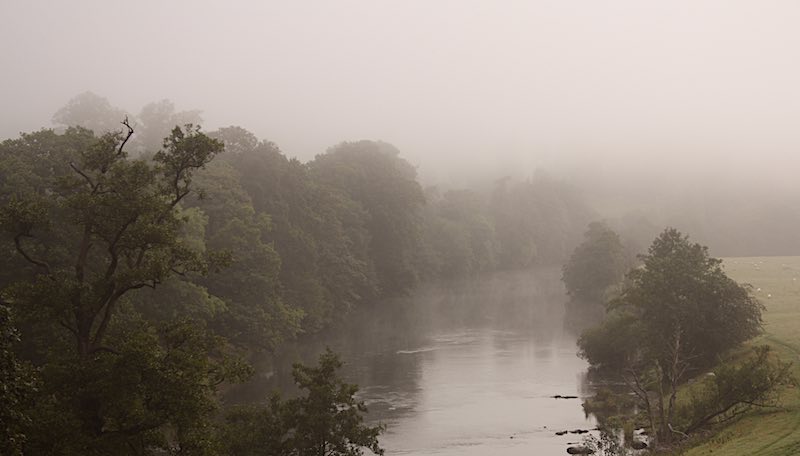
Grayling fly fishing tactics for September
Autumn can be a confusing time because two dates can be used to mark the start of autumn:
- 1st of September, which is the meteorological autumn, or
- the autumn equinox, which is the 22nd of September this year.
Also, September is a transitional month, where the weather transitions from a summer to an autumnal feel. As such, the weather in September can vary from an Indian Summer (unseasonably warm, dry weather) to a cold, wet, and windy affair.
Consequently, you’ll need to adapt your grayling fly fishing tactics to cover the full spectrum of river conditions from drought to flood.
Fortunately, large numbers of grayling can be caught as the temperature cools during September because they start to feed aggressively to fatten up for the leaner months ahead.
Double hooks when fishing a team of flies or nymphs are a distinct possibility at this time of year…
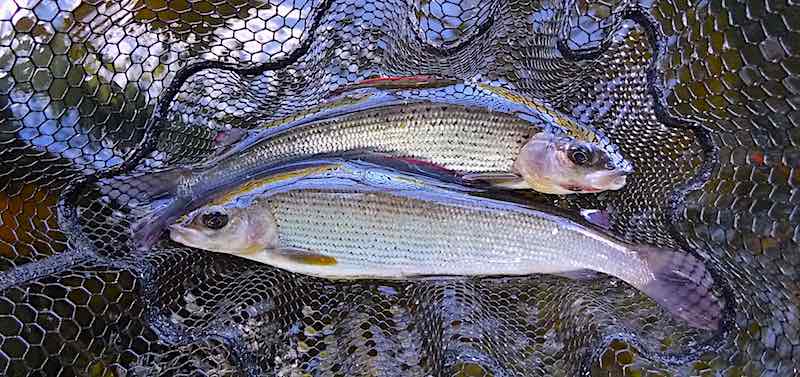
Fly fishing for grayling on mild days in September
In September, there is still a variety of natural flies that you are likely to see hatching on UK rivers…
Up-wing flies
- Pale Watery
- Blue-winged Olive
- Sherry Spinner
- Large Dark Olive
- Iron Dun Blue
- Autumn Dun
- Medium Olive Dun
Sedges & Others:
- Caperer
- Cinnamon sedge
- Midges
Mild, overcast days when the river is running clear usually present a great grayling dry fly fishing opportunity.
Sight dry fly fishing opportunities…
are LOST on stumbling to the river bank.
Carefully approaching the river is the way to proceed…
It will enable you to spot any large grayling lying in shallow water. Then, take some time to observe your quarry to determine…
- whether it’s feeding,
- what fly is being taken,
- and how best to present the dry fly without spooking it.
At best you’ll only get one or two casts before it’s spooked and dashed for cover.
If there’s no evidence of it feeding on dry flies it’s worth selecting an olive imitation and having a cast…
Often it will have been just lying there waiting for some food to present itself.
Prospecting for grayling with the dry fly…
Once opportunities for sight fishing have taken the next step is fishing deeper water with the dry fly.
On spotting a grayling rise others will likely be close by because, unlike trout, grayling are often found in shoals. Therefore, it’s beneficial to cover water nearby with the dry fly because often it will produce one or two more grayling.
Even in the absence of any rising grayling, it’s possible to tempt grayling that are feeding on the riverbed with the dry fly, especially in water less than 4-5ft deep.
Wet fly fishing for grayling…
Fishing a team of wet flies and/or spiders for grayling can produce some fantastic sport when dry fly fishing fails. My preferred locations for wet fly fishing are fast riffles that run into large pools and the tails of pools.
I normally fish a team of three flies on a tapered leader with the flies spaced 3ft apart on a 3lb copolymer tippet (total leader length 15ft). In windy conditions, I shorten the leader and drop to fishing one or two wet flies. This approach has served me well for over 20 years.
Wet fly selection for September depends on what flies you expect to see on the river. However, if you don’t know then my recommendation would be to start with the following three-fly cast on 3lb copolymer (point: #14 Black Hopper; middle dropper: #14 March Brown Spider; top dropper: #16 pearl ribbed March Brown spider)…
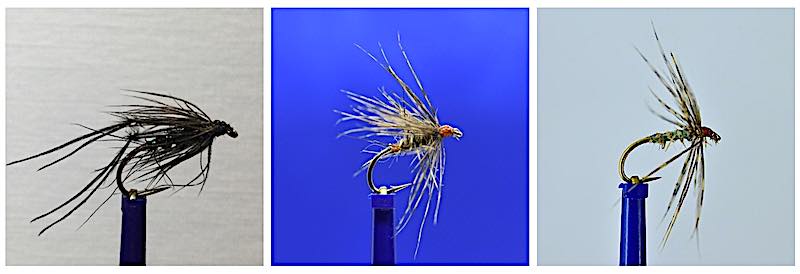
because they continue to serve me very well during September.
Fly fishing for grayling on cold September days
On days during September grayling will be predominantly feeding aquatic insects (Caddis larvae, upwing nymphs, freshwater shrimps, etc.) close to the riverbed. On these unseasonably cold days, the best approach to catching grayling will be fishing close to the riverbed with a team of nymphs.
Short-range nymphing techniques (Euro nymphing or Czech nymphing) are usually the best approaches to a successful day fishing for grayling.
If the river is running clear, I find fishing a team of nymphs that closely resemble the size and colour of the natural aquatic insect present in the river works best. Sometimes a flash of colour in one or more of the nymphs being fished improves the catch results.
For example, the following three nymphs fished on 4lb fluorocarbon leader (point: #12 pink collar pheasant tail nymph 3mm TB; middle dropper: #16 Hare’s ear quill nymph 1.5mm TB; top dropper: #18 claret nymph 1.5mm TB).
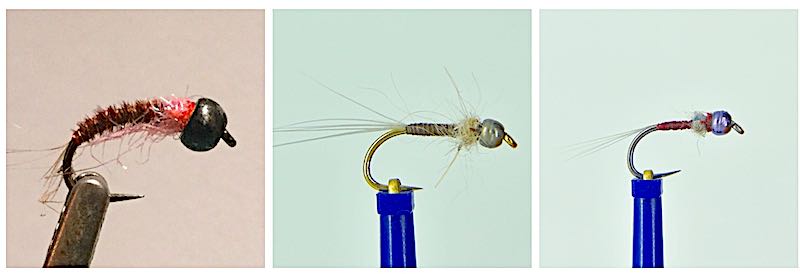
If the river is coloured I normally use large colourful nymphs (#14 to 10). Check out the following post with more information on the best grayling flies for September…
- My 12 best grayling flies for September and how to fish them
- Grayling fishing in September on the beautiful Welsh Dee
Now, let’s take a how grayling fishing changes as we enter October…
Grayling fishing tips for October
By October the memories of summer have gone, and deciduous trees are shutting down for winter with a final display of autumn colours from golden yellow and oranges, through to vivid reds.
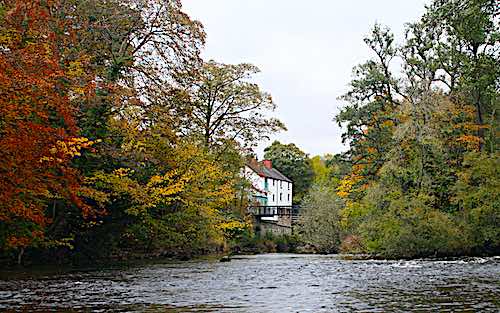
It’s such a beautiful time to be out grayling fly fishing.
Temperatures continue to fall during October and at the end of the trout season, my focus turns to fly fishing for grayling.
In October, fly hatches on UK rivers become less prolific. However, on mild days you’re still likely to see any of the following flies.
Upwing Flies
- Autumn Dun
- Iron Blue
- Small Dark Olive
- Pale Watery
- Sherry Spinner
- Large Dark Olive
Sedges & Others
- Caperer
- Midges
Fly hatches occur during the warmest part of the day. Therefore, be prepared to switch to the dry fly from either nymphing or wet fly fishing because…
‘Happy Hour’ often ends as quickly as it starts!
October is usually a wetter month than September because of the weather fronts rolling in off the Atlantic. As such, river levels are higher and fly fishing with nymphs for grayling often yields the best results.
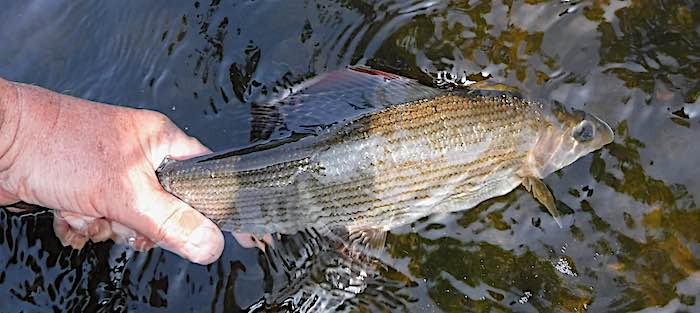
Check out the following post with more information on the best grayling flies I use in October…
- Top 10 grayling flies for October and how to fish them
- Fishing for grayling in October rivers in the Northwest
- Fishing for Welsh Dee grayling”
Moving on into November, let’s take a how fly fishing for grayling changes now the clocks have been turned back…
Grayling fly fishing tips for November
In November, the last month of Autumn, the weather in the North West can range from a mild 16oC to a wintery sub-zero. For mid-November, the long-term historical average high & low temperatures are 9oC & 5oC, respectively.
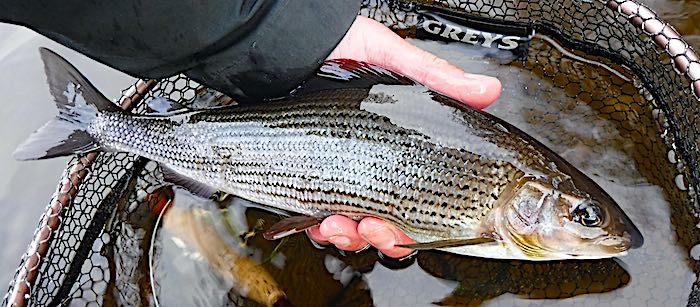
The clocks have been turned back but nature is unaware of this…
Therefore, arrive at the river an hour earlier at the beginning of November to avoid missing the brief, all-important fly hatches…
Upwing Flies
- Large Dark Olive
Sedges & Others
- Midges
On mild days (ca. > 10oC) when the river is running clear it’s likely you’ll see grayling taking flies at the surface. Under such conditions, you can have a…
“grayling bonanza fishing dry & wet flies”
Whereas, when a chill sets in and the temperature drops below 5oC, grayling often feed close to the riverbed. This is when Euro /Czech nymphing becomes the best grayling fly fishing technique.
Check out the following post that has more information on the best grayling flies (dry, wet and nymphs) I use during November…
- 10 grayling flies for November and how to fish them
- Grayling fishing in November on the Welsh Dee & River Eden
- Grayling fly fishing at Llandderfel in November
- Great River Ribble grayling fishing
Well, that’s it for grayling fly fishing in Autumn, and I hope you found it interesting and informative.
If so, you’ll be interested in the post covering “Winter fly fish for Grayling“.
P.S. If you are interested in grayling fly fishing in autumn there is some excellent day ticket water on the Welsh Dee Llangollen and Bangor on Dee.
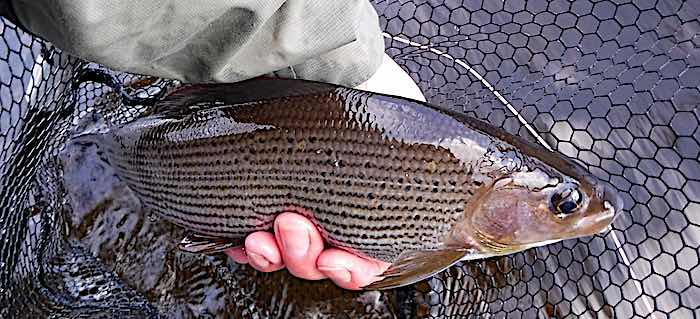
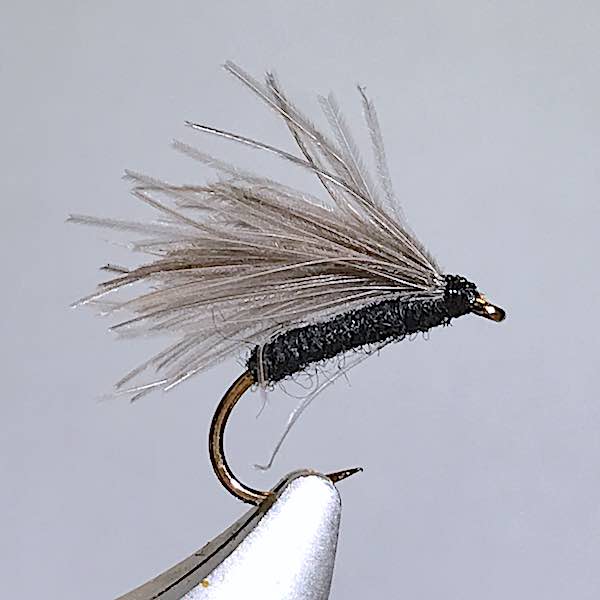
Great blog Andrew. I have noticed as October draws to an end the surface feeding are very spasmodic
Hi Tim,
Even if you don’t see any rises it still worth drifting a dry fly over places where you think grayling might be. You’ll be surprised how many grayling surface out of the blue and take it, even in the winter months.
Glad you enjoyed the post. Cheers, Andrew
Hi, Andrew and many thanks for the Grayling blog – unfortunately as I live in Flintshire the Upper Dee is “out of bounds” to me as the waters in your blog are in either Denbighshire or Gwynedd! That said, I really enjoyed watching you get amongst the Grayling, and learned a lot re the tactics you used. Keep up the good work.
Alan
Hi Alan,
It’s great to hear you enjoyed the blog post. Hopefully, you will be able to get on the Welsh Dee next year.
Keep safe, Andrew
Thanks, Andrew, for the informative article. I love fishing in Autumn and go fishing in my leisure hours. Grayling fishing is new to me. I must purchase fly lines to practice fly fishing and must start to implement the grayling fishing tips mentioned above during my next fishing session.
Great report, lots of very useful information..
Cheers
Another excellent read Andrew very well documented and advice on fly selections
Hi Ian,
Glad you liked the post and thanks for the feedback.
Cheers, Andrew
Once again a great blog Andrew, I really enjoyed the video. May I ask you about the knots you use especially for fluorocarbon line and what knot do you use if joining it to mono?
regards Pete
Hi Peter,
I normally use a double grinner knot for joining fluorocarbon to copolymer. A grinner knot to tie on a fly. For adding droppers I use a surgeon’s knot. I hope this helps.
Thanks for the feedback on the blog.
Cheers, Andrew
Great blog ad allways keep it up
Cheers
I have fly fished for over 60 years and, each time the Trout season ends, I resolve to try for grayling over the Winter period, so far having failed to make it happen. This is the year !!!, and your article looks to be my ideal guide in all its aspects. I have purchased new rods matching your suggestions and will be tying suitable flies for use on my local river, The Ribble.
I hope to report back, in due course with my progress.
Thanks for all your messages and articles. They are much appreciated.
Hi Barrie,
Great to hear the article has encouraged you to give grayling fishing a go on the Ribble. It would be great to know how you get on.
Cheers, Andrew
Great article as per usual, especially the equipment used. One day l will actually venture on to the Dee.
Great to know you enjoyed the post.
Really useful. I am determined to extend my fishing season this year and not stop with the trout.
Great
Thank you really so much Adrew for this exhaustive blog ,It helped me a lot on my firsts approaches to the river Dee last year , where I worked even with my long time experience on the Slovenian and Austria rivers , having unexpected achievements with the flies I was used to fish in there .
Great to hear you enjoyed the post. Cheers, Andrew
Another fantastic blog Andrew, I am gearing up for a winter of Grayling fishing on the Welsh Dee. Really appreciate the work that goes into your posts, really excellent stuff
Hi Sam,
Pleased to hear you enjoyed the article and good luck with the grayling fishing.
Tight lines, Andrew